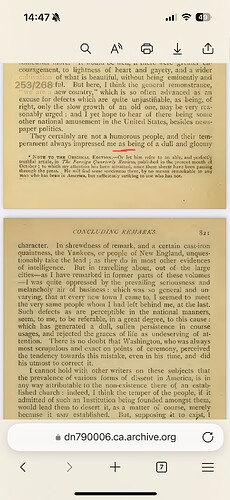原文:They certainly are not a humorous people, and their temperament always impressed me is being of a dull and gloomy character. In shrewdness of remark, and a certain cast-iron quaintness, the Yankees, or people of New England, unquestionably take the lead; as they do in most other evidences of intelligence. But in travelling about, out of the large cities—as I have remarked in former parts of these volumes—I was quite oppressed by the prevailing seriousness and melancholy air of business: which was so general and unvarying, that at every new town I came to, I seemed to meet the very same people whom I had left behind me, at the last. Such defects as are perceptible in the national manners, seem, to me, to be referable, in a great degree, to this cause: which has generated a dull, sullen persistence in coarse usages, and rejected the graces of life as undeserving of attention. There is no doubt that Washington, who was always most scrupulous and exact on points of ceremony, perceived the tendency towards this mistake, even in his time, and did his utmost to correct it.(来源:American Notes for General Circulation, by Charles Dickens
书籍简介:从1842年1月初到6月底,狄更斯携同夫人及几位朋友在美国进行了一次为期半年的访问,足迹所经之处既有华盛顿、纽约、费城、波士顿这样的国际大都市,也有辛辛那提、哈特福德、伍斯特、西点等当时名不见经传的一些小城镇。他将当时的所见所闻以及自己的感受都写进这本游记中,这本游记是考察19世纪美国社会风土人情的一个不可多得的参照。
问题:对于划线部分,“cause”具体指什么?
四种译本供参考:
1:美国国民态度方面一些缺点,我认为绝大部分都可以从这种精神里找到根源。这种精神,在粗俗的积习成俗里,生出了一种执劫不变的呆滞、抑郁气氛,把生活中的美好事物抛弃,认为不足道。(张谷若译,1982)
把“cause”翻译为“这种精神”,感觉很突兀,本段并未提到任何“精神”,整句话的翻译,尤其是“找到根源。这种精神”,像是断了一样,没有衔接,逻辑有点乱
2:这种在整个民族的举止中可以觉察到的缺陷,在我看来,很大程度上归结于这个原因:崇尚质朴,拒绝优雅精致的生活并对它不屑一顾,这是产生阴郁、迟钝性格的根源。(刘晓媛译,2006)
这个译本逻辑更清楚,但是原文“this cause has generated …”,该译本直接将“cause”等同于“a dull, sullen persistence in”,“a dull, sullen persistence in coarse usages”似乎拆成两部分:崇尚质朴……这是产生阴郁、迟钝性格的根源
3:在我看来,美国国民态度中的某些缺点很大程度上都源于这种精神。这种精神在粗俗中孕育出一种呆板和执劫,抛弃了生命中的美好,使其变得不值一提。(刘洋译,2014)
该译本可能参考了张译,同样没有说明“这种精神”具体是什么
4:这样的缺陷可以从所有国民的举止中观察到。我认为,这很大程度上都是因这个理由:这种缺陷让人变得粗俗沉闷,并抵制精致优雅的生活,对它不屑一顾。(李菲译,2017)
“cause”译为“这个理由”,“这种缺陷让人变得粗俗沉闷”读起来没问题,但两句话整体连在一起,就怪怪的,但四个译文中,这个译文似乎最贴合原文
笔者也有问ChatGPT和Deepseek,二机给的解释出乎意料地一致: It (“cause”) refers to the “prevailing seriousness and melancholy air of business”……
